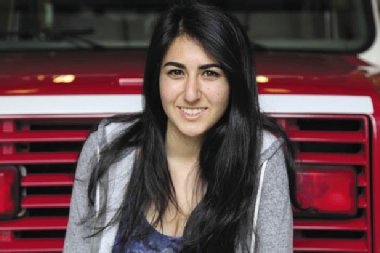Campus News
The Real Deal
Malia Bradley is working on a plan to harvest rainwater and use non-potable water for things like irrigation and toilet flushing on campus. Soraya Danesh is helping students prepare for natural disasters and also make sure their residences are fire-safe. While these tasks may seem administrator-worthy, UCSC undergrads are actually carrying them out as part […]

Malia Bradley is working on a plan to harvest rainwater and use non-potable water for things like irrigation and toilet flushing on campus.
Soraya Danesh is helping students prepare for natural disasters and also make sure their residences are fire-safe.
While these tasks may seem administrator-worthy, UCSC undergrads are actually carrying them out as part of a unique mentorship arrangement called the Chancellor’s Undergraduate Internship Program, or CUIP.
Started 17 years ago as a way to open communication between administrators and students during a contentious time of budget cutbacks and campus development, it has turned into a solid way for students to hone their professional chops and for the university to have needs filled at the same time.
“My tag line for the program is, ‘learn, earn, and serve,” said Barbara Silverthorne, director of the Career Center. “I think it is the heart of what career development is all about.”
Under the program, as many as 36 students each year are matched with projects that will help the university in some way. They are required to work 15 hours per week, attend leadership classes introducing them to the inner workings of the university, and to have a concrete result at the end of the year. In exchange, they are given an $8,200 stipend toward their tuition.
CUIP interns have set up support programs for military veterans returning to college. They have redesigned a child-care center playground, found ways to encourage minority students to stay in school, helped create climate action plans, and analyzed survey data to provide student feedback to campus units. One student organized holistic health workshops to help students relieve stress. Another created a campus bicycle plan.
Along the way, they have learned career skills like problem-solving, consensus-building and self-motivation that are difficult to pick up in a classroom, Silverthorne said. Program alumni have gone on to work as political consultants, city planners, lawyers, academics, grassroots organizers, and teachers.
“They set up a system so you can work independently and also get support when you need it,” said 21-year-old Bradley (Kresge, ’13, environmental studies).
Her internship with the university’s Good Neighbors program has taken her into neighborhoods to open lines of communication between student renters and permanent residents. It has also inspired her to work on her own water-harvesting and allocation proposal as a way to address one of the campus’ critical town-gown issues: water supply and demand.
CUIP, said the Los Angeles native, allowed her to use her communication and problem-solving skills in new ways and also focus on issues important to her. Her goal is to be an environmental lawyer.
For 21-year-old Danesh (College 10, ’13, psychology and economics), an internship with the UCSC Fire Department shifted her career goals.
The daughter of a CPA and a mother who escaped Iran during the revolution, Danesh said her experiences have led her to consider risk management as a career.
At the fire agency, she has been called on to find new ways to inform students about CPR and disaster preparedness classes, to get the word out about safety programs like the CruzAlert emergency notification system and also to help students ensure their off-campus residences are fire-safe.
“I felt like this was something that could help students in a great way,” she said.
CUIP relies on the UCSC Fund for half of its $250,000 budget, unrestricted money that is used to support top campus priorities.
Said Chancellor George Blumenthal: “Thanks to our donors, we can not only offer students a hands-on leadership experience but also get a tangible benefit for the university at the same time. It’s a winning combination.”
Peggy Townsend is a freelance writer based in Santa Cruz.